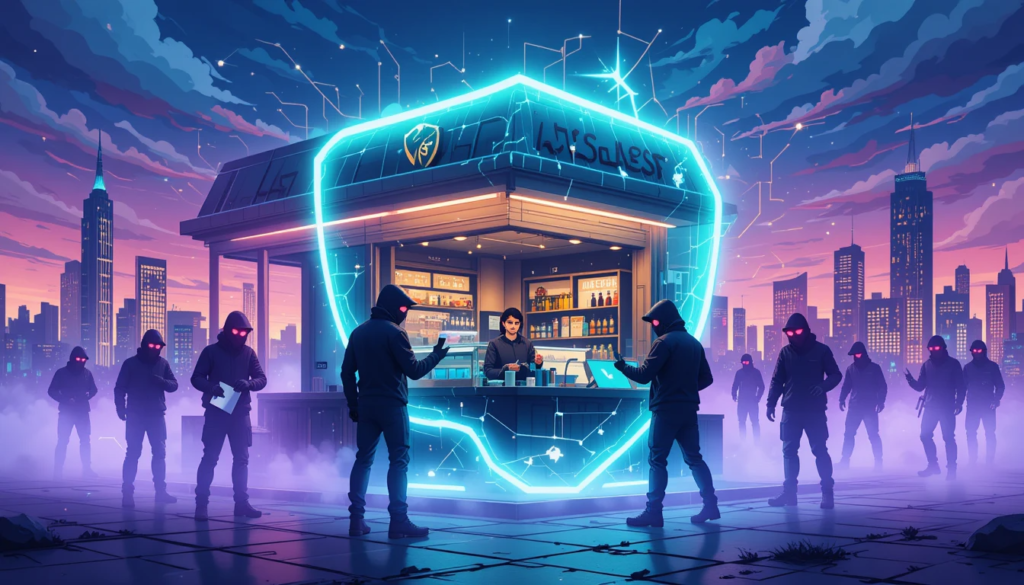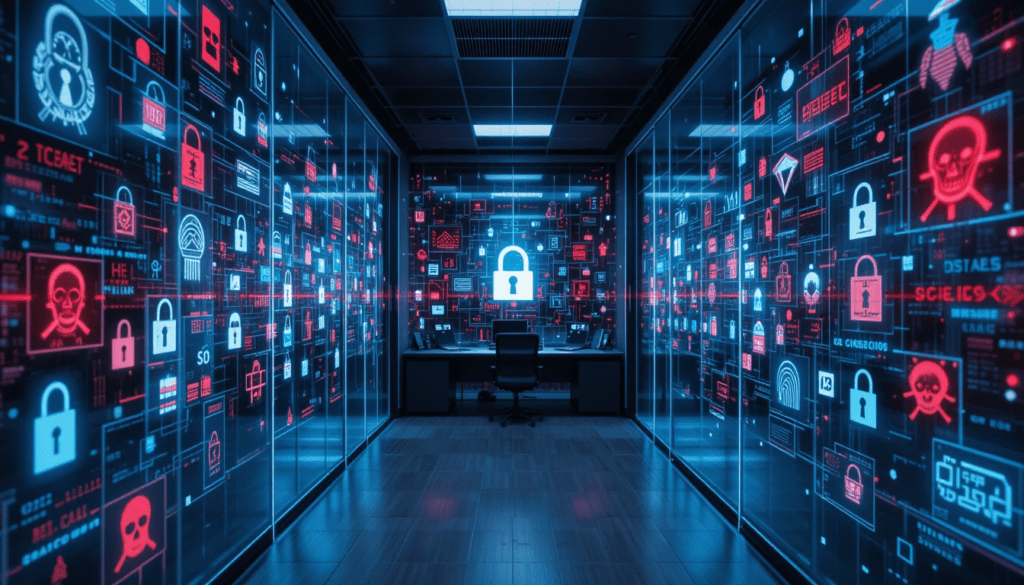Introduction
Cyberattacks are now not just a challenge for big companies—small businesses have increasingly high goals. With limited budgets and resources, many small companies struggle to enforce robust cybersecurity measures. That’s where AI in cybersecurity is making a distinction. Artificial intelligence is transforming how agencies protect against cyber threats, presenting thoughtful, automatic answers that could detect and neutralize risks in real time.
Think of AI as a virtual security defense, continuously tracking for suspicious pastimes and responding quicker than any human ought to. Small companies with cybersecurity safety powered by AI gain a facet in shielding touchy records, preventing breaches, and ensuring compliance. But what does the future of AI in cybersecurity maintain? Let’s dive into its position, benefits, and the rising trends to shape virtual security in the years ahead.
How AI is Changing Cybersecurity
1. Smarter Threat Detection
Traditional security systems rely upon predefined guidelines; however, cybercriminals are continually evolving their methods. AI-powered solutions go beyond constant rules by analyzing styles, behaviors, and anomalies in real-time.
- Machine Learning: AI learns from past assaults and constantly improves its capability to stumble on new threats.
- Anomaly Detection: Instead of awaiting a virus signature replacement, AI spots uncommon behavior that could imply an assault.
- Automated Responses: AI can instantly neutralize threats, shutting down suspicious pastimes earlier than damage takes place.
2. Strengthening Device Security
With more people working remotely, keeping devices like laptops, smartphones, and IoT gadgets secure has become more important than ever. AI helps by:
- Identifying risky conduct, which includes unauthorized logins or malware downloads.
- Enhancing antivirus gear, letting them adapt and understand new threats without constant guide updates.
- Using AI-driven firewalls that analyze network visitors in actual time to block suspicious hobbies.
3. Stopping Phishing and Fraud
Phishing scams fool people into giving away their passwords or financial information. AI helps prevent this by:
- Filtering out suspicious emails, recognizing diffused cues that human eyes might omit.
- Detecting fraudulent transactions and flagging uncommon spending styles to save you financial losses.
- Educating personnel using AI-pushed simulations that teach them how to spot phishing tries.
4. Reducing Workload for Security Teams
Cybersecurity teams address heaps of protection indicators daily, many of which become fake alarms. AI facilitates with the aid of:
- Prioritizing real threats so that human analysts recognize what truly matters.
- Speeding up investigations by using mechanically accumulating information on capability breaches.
- Automating security duties decreases the need for constant guide tracking.

Why Small Businesses Need AI-Powered Cybersecurity
1. Cost-Effective Protection
Hiring a full cybersecurity team is expensive. AI-powered security tools offer strong protection at a lower cost.
- Automated protection procedures reduce manual work, saving money and time.
- Cloud-based AI safety services offer organization-degree safety at low prices.
- AI-driven Managed Security Services (MSSPs) allow corporations to outsource safety to professionals at a lower fee.
2. Easier Compliance with Security Regulations
Many industries require strict cybersecurity standards, and failing to comply can result in hefty fines. AI enables by:
- Automatically scanning for compliance issues and flagging capability violations.
- Generating safety reports that organizations can use to show compliance.
- Protecting client information with encryption and getting the right of entry to controls.
3. Defense Against Ransomware Attacks
Ransomware assaults lock agencies out of their information and traumatic fee for its release. AI allows with the aid of:
- Ransomware detection is conducted early before files are encrypted.
- Blocking malicious hyperlinks and attachments in emails.
- Backing up statistics automatically, ensuring quick restoration in case of an assault.
4. Stronger Password and Authentication Systems
Weak passwords are a standard protection weak spot. AI improves authentication with the aid of:
- Biometric verification (fingerprint or facial reputation) is used to bring protection.
- Monitoring a person’s behavior to stumble on if an account has been compromised.
- Generating and dealing with strong passwords through AI-powered tools.
The Future of AI in Cybersecurity
As cyber threats become more sophisticated, AI is evolving to live in advance. Here are some of the most essential tendencies shaping the future of AI in cybersecurity:
1. Autonomous Cyber Defense
AI is transferring toward self-enough structures that can locate, analyze, and respond to cyber threats without human involvement.
- AI-powered safety systems will expect and forestall cyberattacks earlier than they manifest.
- Automated security patches will restore software program vulnerabilities immediately.
- AI-driven cybersecurity bots will monitor networks 24/7, catching threats earlier than they spread.
2. AI and Blockchain Security
By combining AI with blockchain generation, groups can create noticeably steady systems that prevent fraud and tampering.
- AI-powered fraud detection in blockchain transactions will prevent financial scams.
- Decentralized safety fashions will reduce single points of failure in networks.
- AI-pushed clever contracts will beautify safety in virtual transactions.
3. AI-Enhanced Threat Intelligence
AI is improving how companies share and analyze cybersecurity risk data across industries.
- AI will predict global attack patterns, helping organizations prepare in advance.
- Cross-industry chance intelligence sharing will improve collective security efforts.
- AI-driven analysis will help governments and companies collaborate on cyber threats.
4. AI and Quantum Cybersecurity
Quantum computing will convey demanding situations and improvements in cybersecurity. AI will help expand new encryption techniques to face quantum-powered cyberattacks.
- AI will assist in growing quantum-resistant encryption algorithms.
- AI-pushed simulations will identify and patch protection vulnerabilities.
- Post-quantum cybersecurity models will provide long-term safety against future threats.

Conclusion
Integrating AI in cybersecurity reshapes virtual safety, offering quicker and smarter hazard detection. Small agencies that adopt AI-pushed safety solutions gain considerable advantages in defensive sensitive records, avoiding financial losses, and staying compliant with regulations.
As AI continues to strengthen, the future of AI in cybersecurity will see autonomous protection structures, blockchain integration, and quantum security measures play key roles in securing digital assets. By embracing AI-powered cybersecurity, groups can stay ahead of cybercriminals and build a more secure online environment.
FAQs
1. How does AI improve cybersecurity for small companies?
AI helps small businesses automate threat detection, fraud prevention, and security operations, making it easier to protect data without a full security team.”
2. Can AI prevent phishing attacks?
Yes, AI-powered email filters and behavioral analysis gear stumble on and block phishing emails, faux websites, and malicious links before they reach users.
3. What are the risks of the use of AI in cybersecurity?
Some risks include AI-generated cyber threats, potential bias in machine learning models, and the need for regular updates to keep AI security tools effective.”
4. Will AI update human cybersecurity specialists?
AI will help cybersecurity specialists cope with repetitive responsibilities, but human oversight is still needed for strategic choice-making and complicated risk responses.
5. What is the destiny of AI in cybersecurity?
The future includes AI-driven self-reliant defense, blockchain integration, quantum-proof encryption, and improved global risk intelligence sharing to bolster cybersecurity efforts worldwide.

